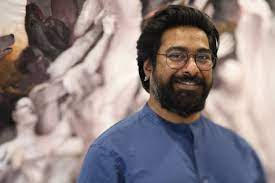
Ali Akbar Mehta
Ali Akbar Mehta (b.1983, Mumbai) is a Transmedia artist, curator, researcher, and writer. Driven by the desire of knowing and participating in the creation of an equal world, his research-based practice is to make immersive archival projects that examine narratives drawn from zones of conflict and dominant power structures, creating immersive, interactive archival projects that foreground overlooked bodies, data, networks, and ecologies. He aims to found processes that would leave deep impacts on the contemporary crossovers of culture, technology and knowledge. His current project Purgatory EDIT is an archival project shaped as a user-generated montage-based VR experience and cinematic installation that highlights long-term and deliberate methods in which digital technologies enforce subliminal visual manipulation, sensory overload, data fatigue, psychological reaction, and ideological numbness. His doctoral research at Aalto University titled Practising Online Performativity: Constructing Politically Conscious Archives as Participatory Art in the Age of Data, Power, and Violence investigates (infra)structural and performative relations between online archives and their users. He regularly writes and lectures on museum-building as a critical artistic praxis, and on archiving as a site for Infrastructural Praxis through the lens of decoloniality, queer-feminist praxis, critical diversity and socio-politics of borderization. Such projects investigate and offer countermeasures to forms of violence and conflict generated as everyday collateral. By experimenting with new archival rules that depart from institutional and coloniality-driven legacy archiving, he generates new knowledge systems of how narratives of history, memory, and identity may be mapped to make visible hegemonic power relations and silenced historical materialism. Such archival mappings – drawings, paintings, new media works, net-based projects, poems, essays, theoretical texts, and performances both of bodies and networks – seek to create knowledge systems that outline a vibrant new political public sphere. His work as performances, installations, talks, and curatorial interventions have been recognised by Helsinki Biennale (2023), documenta fifteen (2022), Tampere Art Museum (2023), Taide Museo ARTSI (2021), Gallen-Kallela Museum (2021), Ainola Museum (2021), Visavuori Museum (2021), Mänttä Art Festival (2021), ONOMA Summer Exhibition-Fiskars (2020), Galleria Saskia (2023), Myymälä2 (2020), Kiasma Contemporary Art Museum (2017), Venice Biennale Research Pavilion (2017), Third Space (2016), TAO Art Gallery (2011-2018), Galerie Mirchandani+Steinruecke (2010), Art Heritage (2010), among others; and awarded the State Art Prize by the Ministry of Art and Culture, Finland (2020) and the Tutkijaliitto-palkinto award by the Finnish Association of Researchers (2019). His work is supported by grants from the Kone Foundation, Arts Promotion Center Finland, Center for Arts, Design, and Social Research, Finnish Cultural Foundation, and Helsinki City. He has been invited as co-curator for the Haihatus summer exhibition in Joutsa, Finland, was a co-curator of the Helsinki Biennale 2023: New Directions May Emerge, and a curatorial advisor to Party Office b2b Fadescha for documenta fifteen. He is a co-founder of the Museum of Impossible Forms and was its co-artistic director from August 2018 to December 2020. He has held positions of accountability in several artist-led associations and institutional spaces in Helsinki, such as Killa Ry (2019-2021), TKOK ry (2021-2022), and Frame Contemporary Art Finland (2021). He holds an MA in ‘Visual Cultures, Curating, and Contemporary Art’, from Aalto University, Helsinki, and a BFA from Sir J. J. School of Art, Mumbai.